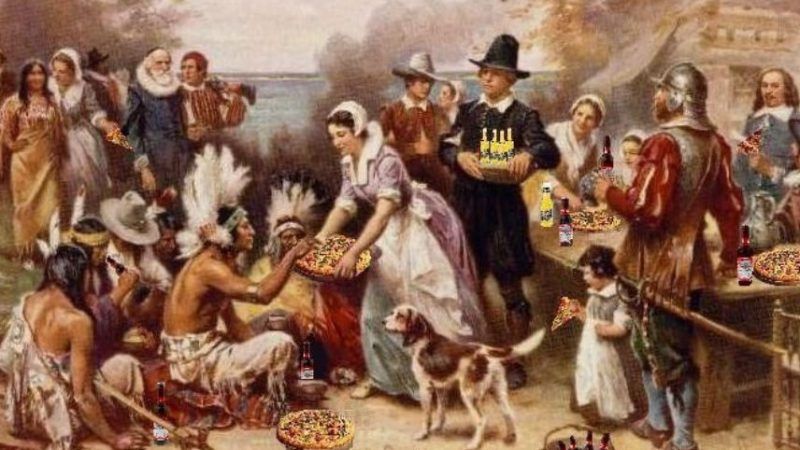Who Really Held the First Thanksgiving in the United States?
The important thing about the holiday is not who started the tradition but the humble and grateful spirit the tradition instills.

Thanksgiving is a great American tradition. As is disputing the holiday's origins.
National mythos portrays the first Thanksgiving as taking place in Plymouth, Massachusetts, in celebration of a bountiful harvest. History.com buys into the myth when it refers to "the original 1621 harvest meal"—although it also acknowledges that "for some scholars, the jury is still out on whether the feast at Plymouth really constituted the first Thanksgiving in the United States."
As a possible contender for the first Thanksgiving on the U.S. mainland, the website cites a 1565 meal of thanks hosted by Spanish explorer Pedro Menéndez de Avilé in Florida. It likewise notes an event that took place "on December 4, 1619, when 38 British settlers reached a site known as Berkeley Hundred on the banks of Virginia's James River" and "read a proclamation designating the date as 'a day of thanksgiving to Almighty God.' "
The latter event has given rise to a long-running complaint that Virginia does not get the credit it deserves for kicking off the national holiday. Two years ago retired newspaper executive Graham Woodlief related the origin story (which included an ancestor of his) in the Richmond Times-Dispatch:
"It all began in the spring of 1618 after four gentlemen had been given a grant, by England's King James I, of 8,000 acres of beautiful land in Virginia on the James River. The four gentlemen were John Throckmorton, George Thorpe, John Smythe, and Richard Berkeley. They formed the Berkeley Company and needed someone to lead the expedition to the New World.
"The group chose John Woodlief (and) made him a captain and the first governor of the new colony of Berkeley Hundred. Woodlief prepared for the trip and leased the good ship Margaret…
"On Dec. 4, 1619, the ship arrived at its destination, Berkeley Hundred, and the men rowed ashore. Clifford Dowdey wrote in his book 'The Great Plantation': 'The men placed their personal luggage on the hard ground, gazed at the woods enclosing them and listened in complete silence. Then at a command from Captain Woodlief, the men kneeled and said a prayer of Thanksgiving to Almighty God for their safe voyage.'
"They did this in accordance with the proclamation they received from the Berkeley Company in England, instructing them, upon arrival, to give thanks and to do so annually and perpetually. The first English Thanksgiving in America had just occurred."
Other colonists held feasts of thanksgiving from time to time, Woodlief notes, "but they were spontaneous and one-time events." Thanksgiving at Berkeley took place every year—until 1622, that is, when the Powhatan Indians attacked the settlement and killed 347 of its inhabitants.
This put a bit of a damper on things, and the settlement was abandoned. "For three centuries," Washingtonian magazine notes, "Virginia's first Thanksgiving was lost to history." That allowed the Johnny-come-lately crowd up in Plymouth to get their hooks into the national psyche and convince Americans they actually came up with the idea.
Not everyone fell for it, though. In 1962, President John F. Kennedy issued a Thanksgiving proclamation that began, "Over three centuries ago in Plymouth, on Massachusetts Bay, the Pilgrims established the custom of gathering together each year to express their gratitude to God."
Kennedy was a Yankee, and didn't know any better. But John Wicker Jr., a former state legislator from Richmond, did—and he took umbrage. He fired off a telegram (like a tweet, only slower) to the White House expressing said umbrage. Historian Arthur Schlesinger Jr. wrote back confessing error: "You are quite right and I can only plead an unconquerable New England bias on the part of the White House staff… I can assure you the error will not be repeated in the future."
Kennedy's next Thanksgiving proclamation not only mentioned Virginia, but listed it first.
Other presidents, unfortunately, have not been so punctilious. In their own proclamations Jimmy Carter, Ronald Reagan, Bill Clinton, George W. Bush, and Barack Obama all slighted Virginia at one time or another. This year Donald Trump will have his first chance to get it right.
Why all the fuss? The important thing about Thanksgiving, after all, is not who started the tradition but the humble and grateful spirit the tradition instills.
Or at least that is what the skunkwaffles up in Massachusetts would like you to believe. Here in the Capital of the Confederacy, with its stately avenue full of second-place trophies, some people still care very much about who came in first. And with regard to Thanksgiving, we all know the real answer, even if some people will not admit it: Pedro Menéndez de Avilé of Florida.
This column originally appeared in the Richmond Times-Dispatch.


Show Comments (56)